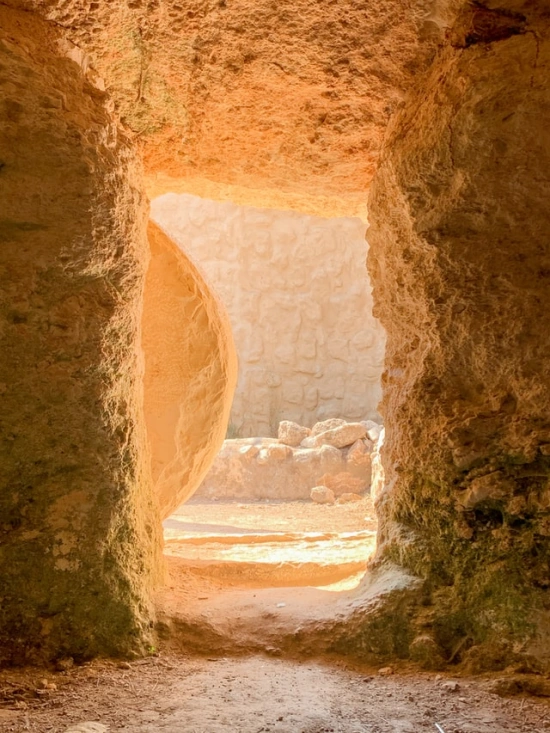
复活
1. 到了一周的第一日,清晨,他们带着预备好的香料和一些[其他的]东西,来到墓地。
2. 但他们发现坟墓上的石头已经滚开了。
3. 进去一看,没有发现主耶稣的身体。
4. 他们正为这事疑惑的时候,有两个人穿着光亮的斗篷,站在他们旁边。
5. 他们惊慌失措,脸朝地,就对他们说,你们为什么在死人中间寻找那活着的呢?
6. 他不在这里,已经复活了,你们要记得他在加利利的时候,对你们所说的话。
7. 说:"人子必须交在罪人手里,钉在十字架上,第三天就复活了。
8. 他们就记住了他的话。
9. 从坟场回来,就把这一切事报告给十一个人和其余的人。
10. 是抹大拉的马利亚、约亚拿和雅各的马利亚,并其余的妇女,把这些事告诉使徒们。
11. 他们所说的,在他们面前好像闲话,他们也不相信。
12. 但彼得站起来,跑到坟墓前,弯下腰来,独自看那铺着的床单,就走了,对所发生的事自叹不如。
约瑟和妇女的意义。
耶稣被钉死在十字架上似乎是一切的结束--人们对弥赛亚的希望的结束,门徒们 "坐在宝座上 "的梦想的结束,以及耶稣在地球上生命的结束。但这个故事远未结束。
在这一天结束之前,亚利马太的约瑟向彼拉多索要耶稣的尸体。按照法律规定,尸体必须在天黑前下葬,彼拉多批准了约瑟的请求,并允许他把耶稣的尸体从十字架上取下来。然后,约瑟用亚麻布把耶稣的尸体包起来,放在坟墓里。
虽然约瑟是犹太公会的成员,即判定耶稣犯有亵渎罪的议会,但约瑟并没有同意这一判决。正如我们在上一集提到的,约瑟被描述为 "一个善良和公正的人",他代表了我们更高的理解力(路加福音23:50). 这是我们的一部分,不仅能够理解这个世界的事物(科学、数学、文学等),而且能上升到更高的层次,接受灵性的光。在这种更高的光中,理解力可以做出既好又公正的决定。这是神赋予的品质。 1
除了将我们的理解力提高到灵性的光辉中的能力,我们还有可能得到上帝赐予的另一种品质。它被称为感知的礼物,只要我们通过爱与主相连,它就会悄悄地流入。这种联系使我们有能力察觉到善和真理。在《圣经》的象征意义中,这种感知是由愉快的香味和甜美的香料代表的。因此,在接下来的情节开始时,写道:"一周的第一天,清早,妇女们拿着她们准备好的香料,来到坟墓前" (路加福音24:1). 2
就像约瑟把耶稣的身体从十字架上拿下来,用亚麻布包裹起来一样,这些妇女也在继续照顾耶稣的身体。综合来看,约瑟和这些妇女都代表了人类思想的两个不同但又统一的方面。就约瑟而言,他代表了更高的理解力,理性的信念,即耶稣所教导的是真的。这是从理解中看到的真理。在妇女的情况下,它是感知,耶稣所教的是真实的,因为它是好的。这是从爱出发对真理的感知。妇女们带来的香喷喷的香料代表了这种感知的礼物。 3
空墓。
在那个时代,坟墓是在坚硬的岩石上挖出来的地方。坟墓的入口是用一块大石头压住的。但当妇女们到达时,她们看到石头已经被滚开了。当她们进入坟墓,想用香料膏抹耶稣时,却找不到他的身体。相反,妇女们遇到了两个穿着闪亮衣服的天使,他们对她们说:"你们为什么在死人中寻找活人呢?他不在这里,他已经复活了" (路加福音24:5-6). 穿着闪亮衣服的天使代表神圣真理的光芒,特别是那些从圣言的内在含义中闪现出来的真理。 4
从象征意义上看,当主的话语没有内在的意义时,它可以被比作是一个空的 "坟墓"。当圣言的字母被用来支持一个错误的信仰时,情况尤其如此。例如,当圣言的字与它的内在含义分离时,就会出现上帝充满愤怒,怀有仇恨,并充满报复。此外,还可能出现那些严格遵守他的教导的人将得到物质财富的奖励,而那些不服从的人将被毁灭。这是对上帝的一种物质观念,相当于 "顺从则昌盛,不顺从则灭亡"。 5
当这些表象从字面意义上确认时,如果不理解其中的属灵含义,就不能揭示主的本质。这就像脱离一个人的真实性格去看这个人,脱离内在而根据外貌做出判断。在这种情况下,主在他的话语中不会被看到,他的声音也不会被听到。圣经的字面意义与赋予其生命的内在精神相分离,就是一纸空文--一个空墓。这就是为什么天使对妇女们说:"你们为什么在死人中寻找活人?他不在这里,他已经复活了"。 6
把消息带给门徒。
在告诉妇女们不要在死人中寻找活人后,天使继续指导她们。"天使对妇女们说:"记住他在加利利的时候对你们说的话。然后天使让她们记住耶稣的话,说:"人子必须交在罪人手里,被钉在十字架上,第三天复活" (路加福音24:7).
尽管耶稣曾数次预言他的死亡和复活,但人们一直专注于他的死亡,以至于忘记了关于他复活的部分。然而,这一次,情况有所不同。耶稣的话现在已经变成了活生生的现实,特别是对这些看到天使并听到他们信息的妇女来说。当天使提醒她们,耶稣说他会被钉死在十字架上并复活时,经文中写道,这些妇女 "记起了他的话"(路加福音24:8).
忆起耶稣的话,妇女们深受影响,赶紧去把这个消息传给门徒(路加福音24:9). 这些妇女不再是人群中无名的人。她们现在成了独特而重要的个体:她们是 "抹大拉的马利亚"、"约亚拿 "和 "雅各的母亲马利亚"(路加福音24:10). 他们对天使的反应和他们立即决定把信息传给门徒的做法,描绘了我们里面真正的知觉和良好的情感对主话语的内在真理的反应。 7
当妇女们把这个喜讯带给门徒,告诉他们耶稣已经复活时,门徒们不愿意相信她们。对这些悲伤的人来说,妇女们的报告似乎不过是一个 "闲话"(路加福音24:11). 然而,彼得却有不同的反应。当他听到这个消息时,他立即站起来,跑到坟墓前(路加福音24:12). 这就是那个当他意识到自己第三次否认耶稣时痛哭流涕的彼得(路加福音22:62). 但现在,彼得感到希望在他内心升起,他急忙跑去亲自看坟墓。
当彼得到达坟墓时,他弯下腰,看到包裹耶稣的麻布躺在一堆(路加福音24:12). 但是没有耶稣的迹象,彼得也没有看到天使。与他前面的妇女不同,彼得的灵眼还没有被打开。然而,彼得并没有感到沮丧。在这一情节结束时,彼得离开了,"自叹所发生的事"(路加福音24:12). 虽然彼得并不完全理解,但慢慢地但肯定地,信仰的复活正在他里面发生。 8
一个实际的应用。
当妇女们想起耶稣的话时,她们立即赶去告诉门徒。当彼得从他们那里听说主已经复活时,他立即起身跑到坟墓前。在这两种情况下,他们都意识到故事还没有结束。我们每个人都可以做类似的事情。当发生的事情有可能使你倒下,或使你怀疑主的存在时,请记住故事并没有结束,主有能力使你站起来。这就是信仰的复活。它是你并不孤单的信心。这是一种信心,相信主会在你的处境中提供安慰、保护和指导。这也是一种信心,即无论情况有多困难,主都能从其中带来好处,并引导你走向美好的结局。 9
在通往以马忤斯的路上。
13.看哪,有两个人同一天去一个村子,那村子名叫以马忤斯,离耶路撒冷有六十个驿站。
14. 他们彼此交谈,谈论所发生的这一切事。
15. 他们正在谈话,争论不休的时候,耶稣就亲自近前,与他们同去。
16. 但他们的眼睛被遮住了,所以不认识他。
17. 他对他们说:"你们走路的时候,彼此交头接耳,说什么话呢?
18. 其中有一个名叫革罗巴的,回答说,你只是在耶路撒冷寄居,不知道这些日子在她里面所发生的事吗?
19. 耶稣说,什么事呢?他们说,关于拿撒勒人耶稣的事,他是人,是先知,在神和众人面前,工作和说话都有能力。
20. 祭司长和我们的官长怎样把他交给死亡的审判,并把他钉在十字架上。
21. 我们还希望是他来救赎以色列。但这一切,今天是做这些事以来的第三天了。
22. 我们中间有几个妇人,清早在墓园里,使我们惊奇。
23. 他们找不到耶稣的身体,就来了,说他们也看见天使的异象,说耶稣还活着。
24. 与我们同在的人中,有几个人到了坟墓那里,发现正如妇女所说的,却没有看见他。
25. 耶稣对他们说,你们这些无知的人,心地迟钝,不相信众先知所说的一切话。
26. 基督不是应该承受这些事,然后进入他的荣耀吗?
27. 他从摩西和众先知开始,把一切经文中有关他自己的事解释给他们听。
下一集开始时,耶稣的两个门徒正前往一个叫以马忤斯的村庄,离耶路撒冷约七英里(路加福音24:13). 虽然他们被称为 "门徒",但他们并不是来自最初的十二个门徒。其中一个门徒名叫克利奥帕,另一个门徒的名字没有提到。
钉死在十字架上已经三天了,这两个门徒已经听说了空墓、妇女的来访和天使的出现。不难想象,他们对最近发生的事件--特别是耶稣死亡和复活的消息感到困惑。在他们交谈的时候,经文中写道:"耶稣亲自靠近他们,与他们同去" (路加福音24:15). 像彼得一样,他无法看到穿着闪亮衣服的天使,这两个门徒的属灵视野也很有限。虽然他们能清楚地认识到有一个陌生人加入他们,但他们没有看到那是耶稣。正如经上所写的:"他们的眼睛受了约束,所以不认识他"(路加福音24:16). 路加福音》再次提供了与理解有关的词语:他们不认识他。
已经 "从死里复活 "的耶稣在精神上与他们同在,但他们还没有意识到与他们同行的人是耶稣。尽管如此,耶稣将逐渐帮助他们打开他们的灵眼。同样地,在黑暗中之后,我们的眼睛必须逐渐适应光明。一瞬间的洞察力和我们对灵性现实的理解的更长时间的发展过程之间是有区别的。瞬间的洞察力可以发生,而我们对属灵真理的理解则是逐渐发生的,并在整个永恒中持续。 10
正在逐渐打开他们理解的耶稣,以一个问题开始。他问道:"你们走路的时候,彼此之间的对话是什么样子的?路加福音24:17). 这描绘了那些我们为最近发生的事情感到悲伤的时候,也许是与朋友讨论,不知道上帝就在我们身边,甚至与我们说话。更多的时候,像这两个门徒一样,我们在悲伤中继续。可以说,我们对属灵的现实 "一无所知"。那个叫克利奥帕的先开口了。他问耶稣:"你是耶路撒冷唯一的陌生人,难道你不知道这些日子在那里发生的事吗?(路加福音24:18).
耶稣仍然隐瞒着他的身份,问道:"什么事?"(路加福音24:19). 他们告诉他一个叫耶稣的人。他们说:"他是个先知,在神和众人面前,言行都有能力"。他们还说,"祭司长和我们的官长把他交给人,定了死罪,把他钉在十字架上"(路加福音24:19-20). 然后他们与耶稣分享他们悲伤的主要原因。正如他们所说,"我们希望是他来救赎以色列"(路加福音24:21). 尽管这两个门徒已经听到了关于可能复活的消息,但他们并不相信。他们似乎确信耶稣已经死了,一切都结束了。在这一点上,他们的希望也已经破灭。因此,他们补充说:"今天是这些事发生后的第三天"(路加福音24:20-21).
当他们继续与耶稣交谈时,仍然没有认出他,他们描述了一些妇女如何在清晨去了坟墓,却没有发现耶稣的尸体。相反,她们看到了 "天使的异象",说耶稣还活着(路加福音24:23). 他们还告诉耶稣,一些门徒在听到妇女的报告后,去了坟墓,发现妇女的报告是真的。正如经上所写的:"和我们同在的人中有几个去了坟墓,发现果然和妇女所说的一样,但他们没有看见他"(路加福音24:24). 重要的细节,"他们没有看见他",只记录在路加福音中,该福音书与理解力的开启有关。换句话说,他们并没有看到耶稣。这两个门徒也没有看到耶稣。即使耶稣与他们同行,并与他们交谈,他们也没有看到他,没有认出他,也没有认识他。
就在这时,耶稣选择打开他们的眼睛,使他们可以认出他。他把他们的思想拉回到圣经上,对他们说:"没有思想的人啊,心地迟钝,不相信先知所说的一切。基督不是应该承受这些事,进入他的荣光吗?"(路加福音24:25-26).
"漫不经心 "和 "信得迟钝 "这两个词再次指出了《圣经》的一个中心主题--在理解中逐渐接受上帝。正如我们已经提到的,理解力发展缓慢。耶稣一次又一次地教导人们关于精神现实的本质和天国。但是,门徒们的心思都固定在这个世界上的事情上,很难将他们的心思提高到属灵的光亮上。正因为如此,他们不能理解耶稣到来的本质,也不能理解他要在对上帝的新认识的基础上建立一个新的王国的愿望。因此,耶稣说他们 "没有思想",这个希腊词的意思是有感性思维,而且 "心里不信"。
就像耶稣在去往以马忤斯的路上遇到的那两个门徒一样,我们的理解力也会慢慢打开,但耶稣对我们永远有耐心。通过他的话语媒介,他展示了救赎的故事是如何包含在经文中的,"从摩西和所有的先知开始" (路加福音24:27). 这是一个简单明了的故事,不仅是关于耶稣的内心旅程,而且也是关于我们的。在这个旅程中,最重要的是打开我们的理解,特别是我们对耶稣和他的使命性质的理解。因此,经上说:"他把有关他自己的事,用一切经文向他们说明"(路加福音24:27).
掰开面包
28. 他们临近他们要去的村庄,他就作势要往前走。
29. 他们催促他说,请和我们在一起吧,因为天色已晚,日头已经暗淡了。他就进来和他们同住。
30. 祂和他们同坐的时候,拿起饼来,祝福了,掰开来给他们吃。
31. 他们的眼睛就睁开了,就认识了他,他在他们面前也就看不见了。
32. 他们彼此说,他在路上对我们说话,给我们开经的时候,我们的心不是在燃烧吗?
33. 那时候,他们站起来,回到耶路撒冷,发现那十一个人和与他们同在的人都聚集了。
34. 说,主真是复活了,并且被西门看见了。
35. 他们就把在路上所做的事,和他在掰饼时被人知道的事,都说了出来。
当他们继续他们的旅程时,这两个门徒和耶稣正在接近一个叫做以马忤斯的村庄。显然,这就是他们居住的地方。就在这里,耶稣表示他将继续走下去。但他们恳求耶稣与他们在一起,说:"请与我们同在,因为天快黑了,白日已过。"(路加福音24:29). 因为他们的催促,耶稣接受了他们的邀请。正如经上所写的:"他进去与他们同住"(路加福音24:29).
从路上走到家里,象征着上帝更深入地进入我们的生活。当耶稣进去和他们呆在一起时,他启动了最亲密的团契行为--分享圣餐。正如经上所写:"耶稣和他们一同坐席的时候,就拿起饼来,祝谢了,擘开,分给他们"(路加福音24:30).
在举行这个众所周知的仪式时,耶稣正在给人们上一堂关于他身份的无声课,暗示他不仅仅是路上的陌生人,而更像是家中的父亲。这是一个深刻的教训,它使他们的灵眼看到了耶稣存在的现实。正如经上所写:"他们的眼睛就睁开了,就认识了他"(路加福音24:31). 这是另一件只在路加福音中记录的事件。在神圣的象征主义语言中,他们的眼睛被打开是指他们的理解力被打开,以便他们可以认识耶稣。
重要的是要注意,路上的对话,当耶稣为他们打开经文时,为门徒们打开他们的灵眼做了准备。但是,当耶稣在他们中间祝福面包并与他们分享时,他们的眼睛就更完全地打开了。面包,因为它是生命的核心,一直是上帝对人类之爱的普遍象征。正是在这一时刻,当门徒们在掰饼时感觉到了上帝的爱,他们的眼睛被打开了,他们知道耶稣就在他们中间。 11
这种经历并没有持续多久。就在他们的意识中闪过认识的瞬间,耶稣从他们的视线中消失了。路加福音24:31). 然而,这次神圣的相遇给这两个门徒留下了持久的印象。他们对刚刚发生的事情感到惊奇,转过身来对每个人说:"他在路上与我们谈话,给我们开经的时候,我们的心不是在燃烧吗"?(路加福音24:32). 当主打开他们对他话语内在含义的理解时,门徒们感受到了主爱的炽热。这是因为圣言中的神圣真理含有主爱的炽热。 12
耶稣向西门显现。
两个门徒对他们在路上遇见耶稣的经历感到惊讶,立即起身返回耶路撒冷,把所发生的事情告诉其他门徒。当他们到达后,告诉他们自己的经历时,耶路撒冷的门徒们也有自己激动人心的消息要报告。"主确实复活了,"聚集在耶路撒冷的门徒们说。然后他们又说:"他向西门显现了"(路加福音24:34).
重要的是,彼得在这里被称为 "西门"。我们记得彼得是门徒中第一个跑到坟墓的人,但一到那里他只发现了耶稣的麻布衣服。显然,"彼得 "没有看到耶稣,但 "西门 "看到了。"他向西门显现了,"他们说。这个重要细节的意义在于对 "彼得 "这个名字和 "西门 "这个名字之间区别的理解。正如前面所指出的,"西门 "这个名字的意思是 "听到"。
每当《圣经》中的 "彼得 "和 "西门 "这两个名字相互对比使用时,"彼得 "代表一种较浅的信仰--基于记忆事物的信仰,而 "西门 "则代表一种较深的信仰--基于听到和执行上帝命令的能力的信仰。因此,经上说:"主复活了,他向西门显现"。 13
耶稣向他的门徒显现。
36.他们说这些话的时候,耶稣自己站在他们中间,对他们说,愿你们平安。
37. 但他们惊慌失措,以为看见了一个鬼。
38. 他对他们说,你们为什么惊慌,为什么在心里起了疑惑呢?
39. 你们看我的手和脚,就是我自己;你们摸摸我,看看我,因为灵没有骨肉,像你们看见我有骨肉。
40. 说了这话,就把他的手和脚给他们看。
41. 他们还不以为然,觉得奇怪,他就对他们说,你们这里有吃的吗?
42. 他们就把烤鱼的一部分和蜜蜂的一部分给他。
43. 祂就拿着,在他们面前吃了。
处理耶稣的 "骨头 "和 "肉"。
在以马忤斯路上遇见耶稣的两个门徒现在已经回到耶路撒冷,与十一个门徒会合。当他们分享遇见耶稣并与他分饼的消息时,耶稣突然出现在他们中间,说:"祝你们平安。"(路加福音24:36).
仿佛仅仅是提到掰饼就足以唤起耶稣的存在。正如耶稣自己所说,在他被钉死在十字架上的前一天晚上,当他掰开面包交给他的门徒时,"这是我的身体,是为你们舍的。这是我的身体,是为你们而赐的,你们要这样做,为的是纪念我" (路加福音22:19). 这个最重要的圣礼包含了一个强有力的教导,即上帝与我们同在的方式,甚至在日常生活中最有形的行为中,如果以敬畏的方式进行。换句话说,当我们在自然和精神层面上同时体验到上帝的爱和智慧时,它就会最充分地呈现在我们面前。
每当我们吃圣餐的面包时,思考着接受主的爱,我们就能做到这一点。同样地,当我们喝葡萄酒时,我们可以思考接受主的智慧。只要我们稍加虔诚地思考,就能将这种简单的身体活动变成最神圣的敬拜行为。通过这种方式,我们可以获得一种精神世界流入自然世界的感觉。这就是为什么圣餐被称为 "共融"。它是灵性与自然的交融,永恒与暂时的交融,主与人的交融,在一个神圣的行为中。即使我们对主流入的爱和智慧没有可感知的经验,我们仍然可以知道,神圣的爱和神圣的智慧构成了上帝的本质,他在圣餐中真正存在。 14
因此,在圣餐中,我们明显地被提醒,只有上帝同时滋养我们的身体和灵魂。肉体的面包和酒是为我们的身体准备的;精神的面包,也就是爱,精神的酒,也就是智慧,是为我们的灵魂准备的。当我们吃圣餐时记住这一点,就能打开我们体验上帝的存在。毕竟,在精神世界里,思想带来存在。因此,我们可以理解,即使是对分饼的虔诚思考,也会唤起耶稣的存在。 15
然而,耶稣知道,他的存在会使门徒们感到害怕,因为他们对鬼魂和精神感到恐惧。因此,他试图通过说 "祝你们平安 "来平息他们的恐惧。然而,据记载,他们仍然 "惊慌失措,以为见了鬼"(《圣经》)。路加福音24:37). 耶稣继续安抚他们的恐惧,对他们说:"你们为什么忧虑?为什么在你们心里生疑惑呢?"(路加福音24:38). 为了消除所有的疑虑,即这确实是耶稣,而不是一个精神,他说:"看我的手和脚,这是我自己的。摸摸我,看看我,因为灵没有骨肉,不像你们看见我有。路加福音24:38-39).
当耶稣告诉他的门徒,他不是一个精神,一个精神不像他那样有肉有骨,他的意思非常具体。他的意思是,他已经成为一个爱和智慧的 "身体"--不是一个物质的身体,而是一个神圣的精神的身体。他的 "肉体 "是他努力给予全人类的神圣的爱,他的 "骨头 "是神圣的真理,通过它可以表达神圣的爱。这样,耶稣以人的形式成为神圣的爱和神圣的智慧--在我们的灵眼里是可见的。 16
这不是一个简单的抽象概念。通过拥有完美的爱和智慧的身体,耶稣基督成为了神圣的人类的完美化身。这样一来,上帝看不见的灵魂(称为天父)和上帝看得见的身体(称为耶稣)成为一体,就像人的身体里的灵魂不是两个,而是一个。 17
这个与天父合二为一的过程,或者说灵魂与身体的重合,是逐步的,持续的,一步一步的,贯穿了耶稣的整个生命,直到他死在十字架上。当耶稣说出他的最后一句话:"父啊,我把我的灵魂交在你手里",他宣布了最后的胜利。他不仅征服了地狱,而且还与他出生时就存在的神性融为一体--被称为 "父亲 "的内在神性。 18
然而,十字架并不是终点。它是复活的开始。当他们来涂抹耶稣的尸体时,却找不到他的尸体了。他只是离开了坟墓,除了他的亚麻布衣服,什么也没留下。虽然对坟墓里发生的事情有很多解释,但最简单的解释是,耶稣荣耀了他的身体,使其完全成为神性。他这样做是为了驱逐他从他的人类母亲马利亚那里继承的一切单纯的人性,同时从天父那里继承了他体内的一切神性。这使上帝能够比以前更接近我们。我们现在可以对上帝有一个概念,这个概念是建立在耶稣基督的生命、死亡和复活中所体现的爱和智慧之上的。 19
吃鱼和蜂巢。
然而,所有这些都远远超出了门徒们的理解。他们需要一个更简单的解释--吸引他们的物质思维方式。因此,耶稣让他们去摸他的手和脚,实际操作他,看看他是不是一个幽灵。所有这一切都发生了,因为耶稣已经打开了他们的灵眼,让他们在灵性意识的层面上体验他。门徒们的印象是,他对他们的显现是在物质层面。这是他们现在所需要的--一个似乎是物质的证明。
但即使如此,他们仍然不相信。正如经上所写的:"但他们仍旧不信,因为欢喜"(路加福音24:41). 也许这好得不像真的。因此,为了把事情说清楚,耶稣问他们是否有食物。当他们给他一块烤鱼和一些蜂巢时,他接过来,当着他们的面吃了(路加福音24:43). 在圣经的语言中,烤鱼代表滋养人的真理--喂养灵魂的真理。而甜美的蜂巢代表一个人在按照这些真理生活的过程中所经历的快乐。 20
对门徒来说,触摸耶稣的手、脚和身体是非常有说服力的;但更有说服力的是看他吃鱼和蜂窝煤。耶稣这样做是在证明,上帝不再被看作是一个遥远的、看不见的、不可知的本质,以抽象的方式充斥着宇宙。相反,上帝现在可以在他复活的荣耀中被看作是一个可接近的神人,准备与所有愿意接受他的人建立互惠的关系。简而言之,一个模糊的、遥远的、远离的上帝变成了可见的、实质性的,并像他来分享的爱和智慧一样真实。 21
一个实际的应用。
耶稣复活的身体的性质长期以来一直是一个争论不休的问题。那是一个异象,还是他真的以肉身存在?即使我们不知道答案,我们也可以知道,耶稣对他的门徒来说是可见的。他们看到了他。对上帝有一个可见的概念,其重要性怎么估计都不过分。我们很难向一个看不见的抽象事物祈祷或爱它。但是,一个可见的、神圣的关于上帝的人类观念是不同的。虽然我们不能指望一个模糊的想法能让我们睁开眼睛理解属灵的真理,或让我们充满原谅敌人的力量,或让我们在诱惑中得胜,但一个神圣的人的上帝可以做到这一点。因此,作为一个实际的应用,请记住在耶稣的生活中所表现出来的上帝的理念。这是一个可见的神的想法,他说:"你要小心,提防贪婪,因为一个人的生命不在于财产的丰富(路加福音12:15). 这是上帝的一个可见的想法,他说:"饶恕你,你就会被饶恕" (路加福音6:37). 这是一个可见的神的概念,他在我们中间行走,医治、祝福和拯救。这是对我们每个人说:"我在你们中间,作为一个服务者 "的神的可见想法。路加福音22:27). 22
耶稣打开了他们的理解。
44. 他对他们说:"这就是我与你们同在的时候对你们说的话,就是摩西的律法和先知的书,以及诗篇上所写的关于我的一切事,都要应验。
45. 然后,他打开他们的心门,使他们明白经文。
46. 祂对他们说,经上所写的是这样,基督也当这样受苦,第三日从死里复活。
47. 要奉他的名传悔改赦罪的道,从耶路撒冷开始,传给万民。
48. 你们是这些事的见证人。
在他的整个传道过程中,耶稣经常告诉他的门徒,他必须去耶路撒冷,被钉在十字架上,第三天他将复活。他知道他们对他的意思理解不深。这一点从他们继续希望他成为他们世俗的王--一个在他的国度里给他们荣誉和权力的王--的方式中可以清楚地看出。
现在这一切都改变了。耶稣已经被钉在十字架上,正如他所说。他又复活了,如他所说。他遵循了为他设定的路线,实现了经文中关于他的所有事情。因此,他对他的门徒说:"这就是我与你们同在时对你们说的话,就是摩西的律法、先知的书和诗篇上所写的关于我的一切事都要应验"(路加福音24:44).
门徒们现在已经敞开心扉,准备接受耶稣所说的。正如经上所写:"他开了他们的悟性,叫他们明白经文"(路加福音24:45). 虽然我们没有得到关于耶稣告诉他们的具体信息,但可能包括一些关于他的降临、生活、受难和复活的预言。当我们更深入地进入希伯来经文的历史和预言部分,一层又一层地去除,我们发现,在某种程度上,我们读到的一切不仅与耶稣基督的生活有关,而且与我们自己的改革和重生有关。 23
"他开启了他们的悟性",这句话是之前所有事情的高潮。到目前为止,门徒们一直沉浸在自己的想法中:例如,他们对弥赛亚在他们中间意味着什么有自己的理解;他们对以色列的救赎会是什么样子有自己的理解;他们对 "伟大 "有自己的理解,包括他们在即将到来的国度里将占据的位置。耶稣不得不以其他方式教导他们。事实上,他必须完全颠覆他们的思维过程,教导他们先者必居后,后者必居先,最大的不是那些被服务的人,而是那些服务的人(见 路加福音13:30 和 路加福音22:26).
像门徒一样,我们每个人都带着自己对成功或幸福的理解开始我们的精神之旅。就像门徒们需要打开他们的理解力一样,我们也需要打开我们的灵眼,以便我们能够真正理解圣经。虽然有无数的事情需要理解,但耶稣在这本福音书的结语中只选择了几个重点。他一开始就提醒他的门徒,通往救赎的道路是通过受难之门。正如他所说的,"经上所记,基督必要受苦,第三日从死里复活"(路加福音24:46).
这是一个关于试探的必要性的教训。没有试探,没有属灵的挣扎,没有愿意背起我们的十字架并跟随耶稣,就不可能有属灵的成长。耶稣在他的一生中都是这样做的,最后在十字架上。在我们自己的生活中,我们经历了一个类似的过程。在每一个试探中,我们都面临着一个选择:我们可以依靠自己的理解力,遵循自己的意愿,或者我们可以相信上帝,遵从上帝的意愿。如果我们在诱惑中获胜,那只是因为我们认识到了自己的自私倾向,并在克服这些倾向时向神寻求帮助。
下一课是关于悔改和罪的赦免。正如耶稣所说:"基督必要受苦,第三日从死里复活,并且要奉他的名从耶路撒冷起,传悔改和赦罪的道"(路加福音24:46-47). 应该注意的是,"悔改 "之后紧接着是 "赦罪 "一词。关键的想法是,一旦我们认识到并承认我们的罪,祈求主的帮助,然后停止犯罪,就像我们自己一样,我们被挡在罪之外,并保持在一个良好的状态。这是奇妙的改造过程的一部分,通过这个过程,主阻止我们远离邪恶,使我们保持在善的状态,不断地阻止我们犯罪,不断地激发善。这就是罪孽被赦免的方式(路加福音24:47). 24
从耶路撒冷开始。
悔改和赦罪的过程应该 "从耶路撒冷开始",这是一个熟悉的概念。耶稣已经教导他的门徒,要先把自己眼睛里的板子拿掉,然后再看清楚,把兄弟眼里的斑点拿掉(见 6:42). 这就是一切的开始:从自己开始。没有什么比诚实的自我观察,以及愿意避开邪恶作为对上帝的罪孽更充分地打开理解。当我们试图停止或回避一个较低的欲望时,更高的光就会流入。但如果我们拒绝做悔改的工作,邪恶的欲望和错误的想法就会留在我们身上。它们不能被减免、宽恕或送走,只是因为我们选择留在其中。 25
因此,"从耶路撒冷开始,传悔改的福音,使罪得赦免 "的劝告意味着,他们应该从专注于学习圣言开始,认为他们首先需要去除自己眼中的斑点,然后才能出去向别人传福音。耶稣教导的真理将提供光亮,使他们能够看到自己的罪恶,并努力避开它们。最终,他们将成为 "这些事的见证人" (路加福音24:48). 他们将能够大胆地见证在他们自己的生活中发生的奇妙变化,因为他们在主的真理之光下承担了悔改和赦罪的工作。正如希伯来经文中所写的那样,"耶路撒冷将被称为真理之城"。 26
在耶路撒冷城内等候。
49. 看哪,我把我父的应许传给你们,你们却坐在耶路撒冷城,直到穿上从天上来的能力。
50. 耶稣领他们出来,甚至到伯大尼,举起手来,为他们祝福。
51. 祂祝福他们的时候,就从他们中间站起来,被带到天上去了。
52. 他们敬拜了祂,就欢欢喜喜地回到耶路撒冷。
53. 他们在殿里不断地赞美和祝福神。阿门。
门徒们已经走了很长的路。他们已经和耶稣在一起三年了;他们见证了他的许多神迹和医治;他们听到了他的演讲,听了他的比喻;他们和他一起吃饭,一起祷告;他们见证了他的审判和被钉十字架;他们还看到了他复活的样子。虽然他们的信仰经常动摇,但却越来越坚定,越来越确定。不久,他们就会去宣扬福音,带领他人,但目前他们需要留在耶路撒冷。耶稣是这样说的。"看哪,我将我父的应许赐给你们;但你们要在耶路撒冷城内等候,直到你们得着从上头来的能力"(路加福音24:49).
我们已经指出,"从耶路撒冷开始 "的命令表明,门徒们在把福音传给其他人之前还有工作要做,特别是悔改和赦罪的工作。但还有更多。耶路撒冷是敬拜上帝和学习经文的中心。圣殿在那里;祭司在那里;在那里庆祝盛大的节日。因此,提到 "耶路撒冷 "这个城市标志着对圣言的研究,并特别关注它如何适用于自己。
在告诉门徒 "在耶路撒冷逗留 "时,耶稣推迟了他们更广泛的传教工作,直到他们能够对经文有更深的理解,并利用这种理解来做悔改的工作。只有到那时,他们才会 "被从上头赐下的能力"。因为如果没有对主和他的话语的正确理解,他们就无法获得这种能力。在他们能够教导别人之前,他们必须了解自己;在他们能够真正爱别人之前,他们必须学会如何去爱。在他们传讲福音之前,他们必须很好地理解福音。所有这些都将是为了发展更高的理解。只有这样,他们才会准备好接受 "父的应许,得着从上头来的能力"。他们必须首先认识真理,然后才能立志和行动。 27
有趣的是,马太福音和马可福音的结尾都是直接委托 "到世界各地去,使万民作门徒"(马太福音28:19) 并 "向一切受造之物传福音" (马可福16:15). 但当我们到了路加福音的结尾,就有了不同。他们首先要 "在耶路撒冷等候",直到他们 "被从高处赐下的能力"(路加福音24:49). 这是一个不同的重点;它是对心灵的不同层次的呼吁。正如我们在这本福音书的开头所指出的,路加福音中的重点是在理解上接受神的方式。我们注意到,路加福音的第一节一开始就提到了 "那些最肯定的相信的事";在第二节,我们读到了"眼见的人"。在第三节,Luke说他有 "完全的理解";在第四节,Luke说他写这些东西是为了让他的读者 "知道你们所受教诲的那些事是确定的"(《圣经》)。路加福音1:1-4).
所有这些术语和短语都暗示了智力--人类本性的认识、思考、理解方面。甚至这本福音书的开篇,描述一个祭司在圣殿里献香,也让人想到宗教的智力方面--祈祷和敬拜的生活,一心一意地阅读、理解和接受经文的指导。因此,路加在开始的地方结束,劝告门徒 "在耶路撒冷逗留"--发展他们对教义的理解,并学习如何将其应用于自己的生活,这是非常合适的。
在路加福音的最后一幕中,耶稣带领他的门徒来到伯大尼,在那里 "他举起手来,祝福他们"(《路加福音》)。路加福音24:50). 甚至在他祝福他们的时候,他就与他们分开,"被带到天上去"(路加福音24:51). 这一幕被称为 "升天",对门徒们来说是一个最重要的时刻。三年来,他们一直对耶稣感到不确定,不知道他的能力有多大,他的爱有多深。但这是在复活之前。现在他们真正知道了。对他们来说,耶稣不再是一个宗教教师或世俗的弥赛亚;他是他们的主。耶稣的观念在他们心中已经上升了。因此,我们读到,"他们敬拜他"(路加福音24:52).
然后他们完全按照耶稣的吩咐去做。正如经上所写:"他们欢欢喜喜地回到耶路撒冷,在圣殿里不断地赞美和祝福上帝"(路加福音24:52-53).
* * *
路加福音》以圣殿为起点和终点。比起其他福音书,路加更多的是涉及到理解的开放。当我们读到喜乐的结论时,我们感觉到门徒们回到圣殿时的兴奋,他们赞美和祝福上帝。虽然这是路加福音的结尾,但人类重生的过程并没有在圣殿里结束。真正的宗教涉及的不仅仅是高度进化的理解。它还包括愿意按照这种理解来生活,也就是说,要做上帝的旨意,而不仅仅是知道它。这就是 "我父的应许 "和 "从高处得着能力 "的意思。
当然,我们的理解力首先要被打开,这样我们才能理解经文,忏悔我们的罪,并开始改革的进程。从某种意义上说,这是我们的 "初生"--就像《创世纪》以 "要有光 "开始一样(《创世纪》第2章)。(创世记1:3). 但接下来必须有其他的东西。在我们第一次出生时,我们祈祷我们的思想能被打开,以便我们能理解经文;在我们第二次出生时,我们祈祷我们的心能被打开,以便我们能按照经文生活。因此,《路加福音》记录了新的理解力如何在我们里面诞生。这是一个第一次的诞生。"他打开了他们的理解力"。因此,神圣系列的下一本福音书将记录必须在我们身上发生的另一个基本诞生:新意志的诞生。
为了详细描述这一过程如何在每个人的心中发生,以及我们如何获得 "从高处来的能力",我们现在转向最后一本福音书--《约翰福音》。
脚注:
1. 爱与智慧247: “灵性之光的涌入使人们......不仅能看到自然的,也能看到灵性的真理,当他们看到这些真理时,就能承认它们,从而得到改造和重生。接受灵光的能力被称为理性。它是主给每个人的礼物,不会被剥夺。如果它被剥夺了,一个人就不可能被改造"。
2. 天国的秘密2831: “那些处于最高感知力的人,从一种内在的观察中立刻知道一件事是否是好的,是否是真的;因为这是由主暗示的,因为他们因爱与他相连。"另见 启示录324: “气味和感知之间有一种对应关系,从这一点可以看出,在精神世界中,所有被感官感知的事物都是对应的,对善和真理的感知就像一种令人愉快的香味一样被人感知。正因为如此,在普通语言中,'闻到'某物意味着'感知'"。
3. 天国的秘密 10199: “所有通过感觉器官感知的东西都标志着精神上的东西,它们与爱的善和信仰的真理有关,如嗅觉、味觉、视觉、听觉和触觉;因此,'嗅觉'标志着从爱的善中感知内部的真理。"另见 天国的秘密3577: “之所以'气味'表示感知,是因为在另一种生活中感知到的善的乐趣和真理的愉快事物,在那里通过相应的气味表现出来。"
4. 破解啟示錄 166:5: “在主的墓穴中看到的天使,他们身穿白色闪亮的衣服出现,标志着神圣的真理。"另见 详解启示录 897: “天使和人一样,不能靠自己思考任何真理,也不能靠自己行善,而只能靠主。这就是为什么'天使'在圣言中表示来自主的神圣真理"。
5. 详解启示录 250: “圣言中的许多事情都是按照表象说的,从这一点可以看出,圣言中说邪恶来自上帝,愤怒、生气和报复属于上帝,以及其他类似的事情;然而上帝没有对任何人作恶,也没有任何愤怒或报复属于他;因为他本身就是善,就是爱;但因为人们作恶并受到惩罚时是这样的表象,所以在文字意义上是这样说的;但在圣言的精神意义上,意义仍然是不同的。"
6. 破解啟示錄 611:7: “物质的东西不会流向精神的东西....。那些从物质角度思考的人,是以邻居的外在形象来思考,而不是以邻居的内在性格来思考。这是在地方上思考天堂,而不是在爱和智慧上思考,而爱和智慧是天堂的本质。圣经中的每一个细节也是如此。因此,一个对上帝以及对邻居和天堂抱有物质观念的人,不可能理解其中的任何东西。对这样的人来说,圣言是一纸空文"。另见 真实的基督教信仰 623: “对上帝以及邻居和天堂抱有物质观念的人,无法理解圣言中的任何内容;对他们来说,圣言是一纸空文。"
7. 天国的秘密 4510: “在话语中,'女性'、'妇女'和'妻子'表示真理的情感和善的情感"。又见
8. 天国的秘密 2405:7: “只要爱和信心的美好在一个人身上起作用,主的降临就会发生。因此,主在第三天早晨的复活涉及到......他每天甚至每时每刻都在重生者的心中复活"。
9. 天国的秘密 8455: “平安里面有对主的信心,他指挥一切,供应一切,他引导到一个好的结局。"另见 天国的秘密 6574:3 “在普遍的精神世界中,从主发出的目的在掌权,那就是任何东西,甚至最小的东西,都不能出现,除非它能带来好处。"
10. 爱与智慧 404: “人出生后,都有一种求知欲,通过这种求知欲,他们获得了知识,通过这种知识,他们的理解力逐渐形成、扩大和完善....。由此产生了对真理的喜爱......特别是对他们所喜爱的主题进行推理和形成结论,无论是经济、民事还是道德方面。当这种感情上升到属灵的事物时,它就变成了对属灵真理的感情"。另见 天国的秘密 6648: “在来世,[智慧]的增长是巨大的,并持续到永远;因为来自神圣的智慧是没有尽头的。以这种方式,天使们不断地被变得更加完美,以同样的方式,所有进入下一世的人都被变成了天使。这是因为智慧的每个方面都能无限扩展,智慧的方面也是无限的"。
11. 天国的秘密 5405: “在古代教会中,当面包被送给另一个人时,就会被打破,这个动作意味着分享属于自己的东西,并将美好的东西从自己身上传递给另一个人。"另见 天国的秘密 9393:5: “在圣餐中,面包象征着主对全人类的神性之爱,以及人类对主的对等之爱"。
12. 真实的基督教信仰 35: “爱的本质是精神之火....当牧师们在教堂里祈祷'天火'充满他们的心时,他们指的是爱"。另见 天国的秘密 8328:2: “神圣的真理内的[精神]热度起源于神圣的善"。
13. 详解启示录 443:3-4: “西缅和他的支派标志着那些顺从的人,因为西缅,这个支派的父亲,是根据 "听 "的意思命名的,而 "听 "标志着顺从。. . .因为'西缅'表示顺从,他也表示信仰,因为当一个人顺从并执行诫命的时候,信仰就成为信仰....彼得被称为'西门'时,这种信仰,也就是顺从,也表示了信仰。"
14. 真实的基督教信仰 716. 从主的话语中可以看出,他在圣餐中是完全存在的,既包括他荣耀的人性,也包括人性中的神性....。此外,他的神性不可能与他的人性分离,就像灵魂不可能与身体分离一样。因此,当人们说主的人性完全存在于圣餐中时,他的神性也随之存在,因为他的人性就是来自于此。既然如此,他的'肉'表示他的爱的神圣的善,他的'血'表示他的智慧的神圣的真理,很明显,在圣餐中,就他的神性和他的荣耀的人性而言,主的整体是无所不在的;因此,圣餐是一种精神的饮食。"
15. 天国的秘密 6893: “在内部意义上,"出现 "并不是指用眼睛看,而是在思想中。思想本身也带来了存在;因为一个人在一个人的思想中出现,可以说是在一个人的内视面前出现。在未来的生活中,这就是实际发生的事情,因为当那里的任何人专注于思考另一个人时,那个人就会站在那里。
16. 天国的秘密 4735: “在道中'肉体'是主的神性好....,主的人在得到荣耀或成为神性之后,不能被认为是人,而是人形的神性之爱"。另见 详解启示录 619:15: “人身上所有的东西都对应于属灵的东西,'肉'对应于自然人的善,'骨'对应于其真理"。
17. 新耶路沙冷及其天国教义304: “主与天父的结合,从天父那里得到了他的灵魂,不像是两个人之间的结合,而是像灵魂与身体之间的结合"。另见 天国的秘密 19: “儿子是神圣的真理;父亲是神圣的善"。
18. 爱与智慧 221: “人是他们自己的善和自己的真理,人是没有其他来源的人。在主的情况下......他成为神圣的善本身和神圣的真理本身,或者说是相同的,他是神圣的爱本身和神圣的智慧本身,无论是在第一件事还是在最后一件事上。"
19. 新耶路沙冷及其天国教义 295: “当主完全荣耀了他的人性时,他就脱去了从他母亲那里继承的人性,穿上了从父亲那里继承的人性,也就是神圣的人性。因此,那时他不再是马利亚的儿子"。
20. 天国的秘密 5620:14: “主复活后在门徒面前吃的蜂窝和烤鱼也是道的外在意义的标志,'鱼'是指与该意义相关的真理,'蜂窝'是指与之相关的快乐"。另见 详解启示录 619:15: “'蜂巢'和'蜂蜜'这两个词象征着自然的美好"。
21. 新耶路撒冷教义之主篇 35[2]: “天主承担了人,也就是把它与自己结合在一起,就像灵魂与身体结合在一起一样,所以他们不是两个人,而是一个人。由此可见,主从母亲身上脱下了人,这本身就像其他任何人的人,因此是物质的,而穿上了从父那里来的人。"另见 真实的基督教信仰787: “神与人的所有结合也必须是人与神的对等结合;除非有可见的神,否则这种对等是不可能的"。
22. 真实的基督教信仰 538: “应向救世主上帝祈祷,以获得帮助和力量来抵御邪恶......这是因为不可能与看不见的、因此无法接近的父亲结合。正是由于这个原因,他自己来到世界上,使自己可见、可及,并能与人结合,完全是为了这个目的,使人可以得到拯救。因为除非在思想上把上帝当作一个人,否则所有关于上帝的想法都会丢失,就像视线被引向宇宙,也就是引向空旷的空间,或者被引向自然或自然中可见的东西。另见破解啟示錄序言。"天堂的整体是建立在对上帝的正确观念上的,因此,地球上的整个教会,以及所有的宗教也是如此。因为对上帝的正确观念会导致结合,并通过结合导致光明、智慧和永恒的幸福"。
23. 天国的秘密 3138: “主的意愿是来到世界上,作为一个人出生,作为一个人接受指导,作为一个人重生。然而,不同的是,人类是主的重生,而主不仅重生了自己,而且还荣耀了自己,即使自己成为神性。人类是通过慈善和信仰的涌入而获得新生,但主是通过在他体内的神性之爱而获得新生,而这是他自己的。因此,可以看出,人的重生是主的荣耀的形象;或者说,在人的重生过程中,可以看到主的荣耀过程的形象,尽管是遥远的。"
24. 天国的秘密 19: “赦罪是要从邪恶中退出来,并且,要靠着主保持善"。又见 新耶路沙冷及其天国教义166: “人们认为,当罪被赦免时,罪就被抹去了,或被洗掉了,就像水洗掉了污垢。但罪孽不是被抹去的,而是被带走的。也就是说,当人们被主保持在一个良好的状态时,他们就被挡住了;当他们被保持在这种状态时,他们似乎没有了罪,所以好像那些罪被抹去了。人们越是被改造,就越能被保持在善的状态中"。
25. 破解啟示錄 386:5: “每个人都可以在理解方面处于天堂的光辉之中,只要意志在其邪恶方面是封闭的"。另见 新耶路沙冷及其天国教义164: “为了悔改而审视自己的人必须审视他们的思想和他们意志的意图。在这一点上,他们必须审视自己如果可以的话会做什么,也就是说,如果他们不害怕法律,不害怕失去名誉、荣誉和收益。一个人的所有恶行都可以在那里找到,人们实际做的所有恶行都来自于这个源头。那些没有审视自己思想和意志的恶行的人不能悔改,因为他们事后会像以前一样思考和行动。然而,愿意做坏事与做坏事是一样的。这就是自我检讨的意义"。
26. 天国的秘密 402:2 “经上说,'耶路撒冷必称为真理之城'....,其中'真理之城'或'耶路撒冷'标志着信仰的属灵事物"。另见 天命278: “为了使人们能够审视自己,他们被赋予了一个智力,这个智力与他们的意志分开,以便他们可以知道、理解和承认什么是善,什么是恶,也可以看到他们意志的特点,或者他们的爱和欲望。为了让人们看到这一点,他们的智力被赋予了一个较高和较低的思想,或一个内在和外在的思想,从较高或内在的思想中,他们可以看到他们的意志在较低或外在的思想中的表现。他们看到这一点,就像有人在镜子里看到自己的脸一样,当他们这样做,知道什么是罪,他们就可以,如果他们恳求主的帮助,停止愿意它,克制它,随后表现得与它相反。"
27. 新耶路沙冷及其天国教义 6: “说'圣城,新耶路撒冷......因为在话语的精神意义上,城市和城镇表示教义,而圣城是神圣真理的教义"。另见 天国的秘密 3863:3: “对理解力的信仰,或对真理的理解,先于对意志的信仰,或对真理的意愿,这对每个人来说都必须是显而易见的;因为当一个人不知道任何东西(如天国的善)时,这个人必须首先知道它的存在,并理解它是什么,然后这个人才能意愿它。"






